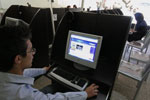 Wall Street Journal: The U.S. has accelerated its effort to provide dissidents in Iran with computer hardware and software to evade government censors.
Wall Street Journal: The U.S. has accelerated its effort to provide dissidents in Iran with computer hardware and software to evade government censors.
The Wall Street Journal
Administration Seeks to Help Counter Tehran’s Jamming of Websites and Western Broadcasting; Some Rights, Democracy Groups Lose Bush-Era Backing
By JAY SOLOMON
 WASHINGTON—The U.S. has accelerated its effort to provide dissidents in Iran with computer hardware and software to evade government censors. But it’s a shift that many activists say is insufficient to bring political change in Tehran.
WASHINGTON—The U.S. has accelerated its effort to provide dissidents in Iran with computer hardware and software to evade government censors. But it’s a shift that many activists say is insufficient to bring political change in Tehran.
During much of the Obama administration’s first year—reversing the approach of the George W. Bush administration—the White House withheld action on unilateral economic sanctions and other measures seen as challenging Iran’s regime. Its hope was to engage Iran diplomatically instead.
But this week, the U.S. pushed through new United Nations Security Council sanctions against Iran, days before the first anniversary of the Iranian “Green Movement” uprising against President Mahmoud Ahmadinejad’s re-election on June 12.
In announcing the sanctions, President Barack Obama said the measures were as much designed to aid the country’s political opposition as to end Tehran’s nuclear program.
The Obama administration also says it is seeking to aid the Green Movement by facilitating its ability to communicate inside Iran and by punishing government entities responsible for the political crackdown.
As part of its revised strategy, however, the State Department is reversing course from the Bush administration and is no longer funding some aggressive institutions focused on crafting training programs for democracy activists or offering other services intended to aid Iran’s opposition.
The U.S. has cut new funding for programs including a center established in New Haven, Conn., to catalog human-rights abuses in Iran; an Iranian journalist-training initiative and a social-networking program focused on promoting democracy and human rights inside Iran.
“Because Iranians seem willing to take risks, we should be willing to provide them help when requested,” says Jennifer Windsor, executive director of Washington’s Freedom House. The State Department last year declined to provide $3 million in funding to keep open a Freedom House online magazine in Farsi that focused on democracy promotion.
U.S. officials say many of the programs had little impact inside Iran, a charge disputed by their administrators.
U.S. officials say they haven’t pared back support for Iranian democracy, stressing that they have increased it in the communications area.
The State Department declined to say how much the U.S. is spending specifically to support democracy promotion inside Iran.
One primary goal of the U.S. tech-support program is to counter Tehran’s jamming of Iranian websites and Western broadcasting, including reporting from the Voice of America, which Tehran routinely blocks, and U.S.-funded Radio Farda, which provides real-time political news.
As part of the effort, the Treasury Department’s Office of Foreign Assets Control, which enforces U.S. trade sanctions, provided San Francisco-based Censorship Research Center a license to export Haystack antifiltering software to Iran.
In March, the office lifted restrictions on American tech companies like Yahoo Inc. and Google Inc. exporting mass-market software, such as chat and instant messaging, to Iran. The Green Movement has used social-networking tools like these to organize protests.
In the past, the U.S. banned such exports, fearing Iran’s military could use the technology.
“We, government-wide, are making a sustained effort to make sure information technologies are available for Iranian citizens,” said Adam Szubin, the director of the Office of Foreign Assets Control.
Administration officials note that the U.S. specifically sought to target the businesses of Iran’s elite military unit, the Islamic Revolutionary Guard Corps, and successfully blacklisted 15 IRGC firms. The U.S. has also sought to highlight the Iranian government’s human-rights abuses on U.N. panels, and succeeded early this year in denying Tehran a seat on the U.N. Human Rights Council. Washington’s envoy to the council said Thursday that Iran was still discriminating against minorities and failing to safeguard freedom of expression and assembly.
At the same time, Green Movement representatives in the U.S. and Europe say they are involved in a broadening dialogue with U.S. officials about how to best promote democracy in Iran. The meetings have taken place in Europe and at Washington hotels, think tanks and restaurants in recent months, according to participants. The State Department confirmed the meetings.
The U.S. is also extending tech support for circumventing censors to Cuba, China and the Sudan—though officials say the program has been fueled by concerns about Iran.
The State Department declined to say how it will help Iranians get new technologies. Private companies such as Haystack say they can encrypt their websites against government hacking as a means to allow Iranians to download the applications.
Dissidents are calling for more. “There’s a better atmosphere in the U.S. than before concerning the communications issue,” said Ali Akbar Mousavi Khoeni, a former Iranian lawmaker who left Tehran for the U.S. in June 2009. “But I think we’re only at the first step.”


